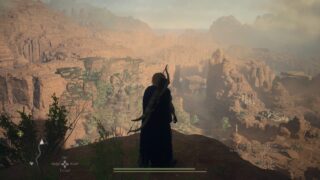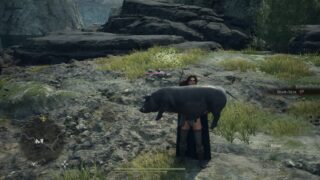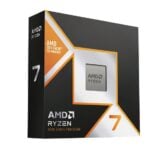Dragon’s Dogma 2 is the most vital action RPG since Elden Ring
Capcom’s epic expects you to meet it on its level, and when you do, you’ll find one of the best RPGs of the last decade
- Director
- Hideaki Itsuno
- Key Credits
- Makoto Ikehara (Lead scenario writer), Jun Takeuchi (Executive producer)

Dragon’s Dogma 2 is going to be a nightmare for completionists.
As you play through the utterly massive game, you can almost physically feel yourself missing out on content as story choices are made, loyalties are declared, and vital characters are killed. You’re already mentally booking your second playthrough, even though you’ll probably not begin your second journey through the world of Dragon’s Dogma 2 for eighty more hours.
It’s a game that’s rich in possibility everywhere you turn. The world is so dense that you can literally get to the end of the story, fulfill the majority of the main quest objectives, and then realize there’s a whole faction, town, or multi-part mission you’ve missed. Dragon’s Dogma 2 is begging you to explore.
Despite the twelve years since the release of the original game, Dragon’s Dogma hasn’t taken the lessons of the last decade of gaming to heart – and it’s better for it. It’s a huge, open-world fantasy action RPG, but the game that just conjured in your mind from a mechanical perspective couldn’t be further from Dragon’s Dogma 2’s reality.
More Dragon's Dogma 2 guides:
- How to get a Bunch of Flowers in Dragon’s Dogma 2
- How to find the Nameless Village in Dragon’s Dogma 2
- Where to find Captain Brant in Dragon’s Dogma 2
Fast travel is a hard-won consumable. There are barely any mission markers, even for vital quests. Do you want to uncover a piece of the map? Well, you better walk over to it. There are no towers here, and there are no endless skill trees. When faced with a decade of open-world games coated with the same artificial flavour, Dragon’s Dogma 2 doesn’t back down; it doubles down.
So much of it feels like game design out of time—in a refreshingly positive way. Right from the off, you’re tasked with reaching the first main city. This is a trite task in any game, setting the player off on a light adventure to get to grips with the controls before introducing them to the larger stakes and the main characters.
In Dragon’s Dogma 2, you can easily lose your guide, which in turn loses a marker to follow, meaning you have to get to the first city, which includes a sub-boss fight all on your own. You begin thinking as if you’re really on this adventure. Sure, if we take the road it will probably lead us straight to the city, but our party is weak and the roads are lined with enemies.
Could we climb the hills that pen us in on all sides? Potentially, there’s plenty of Skyrim-style jumping up odd-shaped hills to go around, but there’s no way of knowing if the other side of that hill will be sheer drop, sending us tumbling to our deaths. Where are we supposed to heal? We’ve no camping items, and we’re between both towns. Did you just hear a Cyclops? Dragon’s Dogma 2 is second only to Baldur’s Gate 3 in how faithfully it recreates the organic chaos of a D&D session.
Dragon’s Dogma 2 doesn’t play the game for you. For example, if you’re tasked with going into a town and finding a specific person to talk to, you have to find that person. There’s no glowing exclamation mark. There’s little in the way of UI direction. If you want to know what to do, you can either talk to people in the town, consult your vague mission log, or just explore.
As a result, even somewhat mundane mission objectives feel far more satisfying because you’ve actually done something; you’re not just a tourist being ferried from cutscene to cutscene. Sometimes, the answer is literally to go back to a quest giver with half the information they require, which will open up a new dialogue option for them, leading you on a completely separate path. You’d need a corkboard with red string the size of Camp Nou to ferret out every possible way each mission can go.
“Dragon’s Dogma 2 is so dense that you can literally get to the end of the game, fulfill the majority of the main quest objectives, and then realize there’s a whole faction, town, or multi-part mission you’ve missed. Dragon’s Dogma 2 is begging you to explore.”
Dragon’s Dogma 2’s secret sauce is the Pawns. Returning from the first game, Pawns are AI-controlled lackeys that follow you around the game and will fight by your side. During the game, you travel with three Pawns, one of which you create yourself, and the other two created by other players.
The game world is populated by player-created Pawns that will approach you on the road and offer their services. Similarly, your Pawn will end up in other people’s games and will return with gifts and gold. You make your Pawn using the game’s incredibly deep character creator and hairstyle customisation, meaning during the review period, the streets were lined with Kratos and Geralt of Rivia, not to mention Paul Atreides of Dune (to match our own Chalamet-inspired player character.)
Perhaps unsurprisingly, due to the scale of the game, there’s a fair amount of ‘jank’. While nothing we encountered was game-breaking, we had two occasions wherein the sequence of a mission broke because the character that was due to appear at a set time disappeared from the area. NPCs almost always have a set schedule, not unlike something like Fallout 3, or Skyrim, but, just like those games, this means that if they get off track, things can break.

Another pitfall is in the game’s performance. We reviewed on PlayStation 5, which targets 30 frames per second. Targets is the operative word as Dragon’s Dogma 2’s framerate begins to visibly buckle during the game’s most intense action scenes. It’s not fair to say that Dragon’s Dogma 2 is a game that performs badly, it’s just worth noting that it can get choppy during large battles.
But in truth, we can’t emphasize enough how little any of that matters when we consider our time with Capcom‘s RPG. It’s a game that seeps into every aspect of your life. You’ll find yourself thinking about it when you’re doing the dishes. You’ll play into the wee hours of the morning, only to find a random item that will surely lead to another entertaining side quest.
In many ways, Dragon’s Dogma 2 feels like the antidote to the open-world malaise of the last decade. Its confluence of stellar world-building, expansive combat, and engrossing atmosphere make it an experience that, even after you’ve rolled credits, you’ll happily go in for more, because you know you’ve barely scratched the surface of what it has to offer.
We can’t even tell you the best thing about Dragon’s Dogma 2. It’s a game that’s so full of surprises, that each time it dazzles you, you think “Surely that’s it,” but no. The game ramps up show-stopping moments throughout, but there’s one moment that players and developers will reference for decades. It’s a moment that will have your jaw smashing through your floor into your downstairs neighbour, and we can’t implore you enough to experience it and the rest of this magnificent game for yourself.
If the popularity of Elden Ring wasn’t a clear enough indicator, let Dragon’s Dogma 2 be used in boardrooms across the world as the shining example of what a modern, massive, gorgeous open-world game can be. Players want freedom. Players want to feel like they played a role in this role-playing game.
Dragon's Dogma 2 is one of the best RPGs of the last decade. Capcom's incredible run has reached unfathomable heights with a game that's destined to be beloved by players and revered by developers in turn. It's a game that refuses to hold your hand, but will give you all the tools to experience an adventure that's one for the ages.
- Total RPG freedom
- Extremely interesting world
- Utterly confident in its lack of hand-holding
- Fun, expansive combat
- Stellar soundtrack
- Console performance hits occasional potholes
- Some RPG jank
























